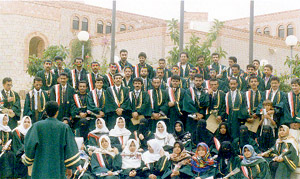
Higher Education in Yemen [Archives:2001/52/Reportage]
December 24 2001

Despite the high increase in graduates of higher education, these form only 3-4 percent of the total manpower. This fact led the private sector to contribute to the spread of higher education by the establishment of more universities during the last two decades of the twentieth century. However, many educationists believe that the increase in the quantity of universities has been coincided with a deterioration of the quality of education.
In our country, the private universities started to emerge in the beginning of the 1990s. So far eight private universities including 44 different colleges have been established.
On May 30, 2000 Yemen organized the Non-government Higher Education Conference which lasted till June 1 2000. A good number of Arab and Yemeni researchers participated in the conference and around 40 scientific researches were discussed. Discussions centered on the institutional structure of the non-government higher education, the higher education and the development of human resources and the future vision of higher education.
The conference came out with a number of recommendations such as consolidating the mechanisms of universities with regard to their targets and functions, providing incentives for female students in order to join the higher education, conducting studies and researches at the universities, higher studies and research centers to meet the requirements of development, etc.
A number of working papers discussed during the conference dealt with the definition of higher education, reviewing the history and origin of higher education using educational systems of different countries. Dr. Faek A.A. Radwan of the Near East University at the Turkish Republic of Northern Cyprus made a distinction between the higher education and high school education, governmental and non-governmental higher education and the effects of the non-governmental high education in supporting the economy of the country.
Professor Dr. M. Shamsher Ali, Professor of physics at the Bangladesh Open University dealt with Distance Education as a parading shift in science education of developing countries in the new millennium.
The working paper Restructuring the Higher Education presented by Dr. Ibrahim Othman Nani and Dr. Khaled Omer Basulaiman described the problems facing the higher education namely the population growth and the industrial growth. The paper gave some statistical data showing the need of graduates to the industrial and technical fields. Finally, the paper gave some proposals concerning the supervision of the academic work of the private universities with the aim of improving its role in the society so as to gain its reputation.
Other working papers focused mainly on training of lectures for non-governmental higher education and the importance of using computer in the learning processes in the non-governmental universities. It is believed that to enhance learning among students, drill and practice and tutorial programs are the remedies.
Human development indicators for the Arab States are somehow alarming. The percentage of people below the poverty line is around 30 percent. The illiterate are around 25 percent and around 9 million children at primary school age and 15 million at secondary schools.
The new global learning infrastructure that draws its capabilities from digital technology and the Internet could play a decisive role in overcoming the regional issues with respect to education. The enabling infrastructure could:
Extend access to virtually anyone men and women, old and young part and full-time. Provide convenient time to support continuos education, stated Abdullah Dewachi. regional advisor on telecommunications and information technology at the UN-ESCWA.
In his paper, Prof. A.D Abdullah, discussed the significance of training a researcher which lies in promoting the Ummah to the peak of its culture and civilization. It is also regarded as a strong means in the education system, he said.
The paper elaborated the methods and stages of training a researcher with a comprehensive and encyclopedic outlook. It also focused on the fact that it is not sufficient to select a researcher by looking into his academic excellent grades for grades do not guarantee his being excellent at academic research. The utmost importance should be given to his intellectual capabilities that whether he possesses an open unbiased mind and has a deep thinking capability in various issues or not, he said.
——
[archive-e:52-v:2001-y:2001-d:2001-12-24-p:./2001/iss52/report.htm]


